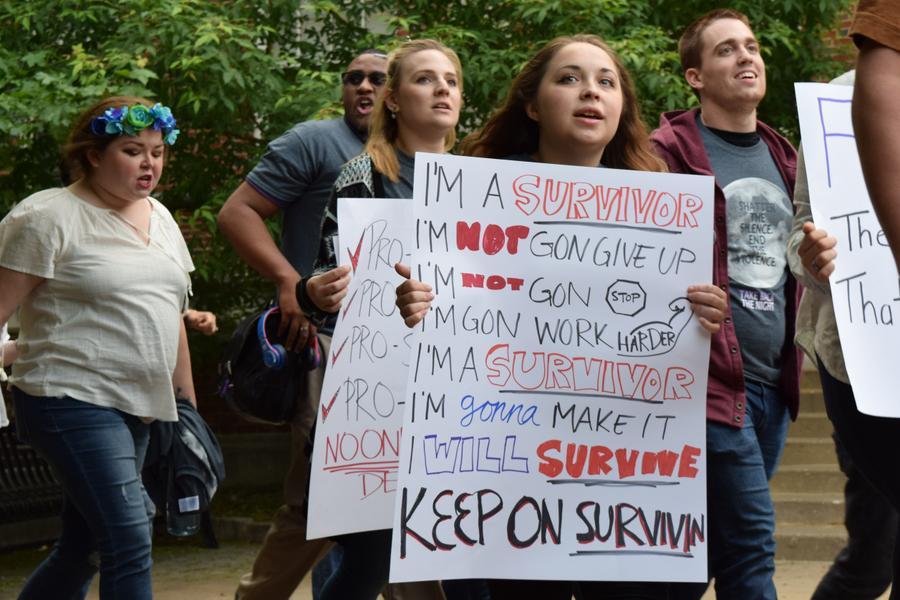Friends posed together for pictures as music played in the background. Event staff handed out T-shirts. But this night was serious, too. More than 20 people shared stories of personal collisions with sexual violence, assault and abuse. Several spoke publicly about their experiences for the first time ever.
More than 100 students and community members gathered in Traditions Plaza on Thursday for [Take Back the Night](http://takebackthenight.org/), an annual event designed to garner support and strength for victims and survivors of sexual violence.
“Our ultimate goal (at the Relationship and Sexual Violence Prevention Center) is to put ourselves out of business. That’s why we’re here, that’s why we’re doing what we’re doing.” RSVP Center coordinator Danica Wolf said.
After hearing introductions from RSVP Center representatives, attendees marched from Traditions Plaza to Francis Quadrangle and through the Student Center, eventually returning to their starting point. Participants made signs with messages like, “Communication is sexy and consent is mandatory” and “We are not your things.”
As the crowd marched, participants chanted, “What do we want? Justice. When do we want it? Now,” and “Claim our bodies, claim our right. Take a stand, take back the night.”
After the march, participants held battery-powered candles in a vigil for victims and survivors who were unable to attend the event. The candles also provided a transition into Speak Out, where anyone could share their story.
Some planned to get on stage, while others said they did not have anything planned. Some spoke of childhood abuse, while others spoke of unwanted encounters from their first year at MU. Whenever someone emerged on stage, the audience clapped to signal their support for the speaker.
RSVP Center graduate assistant Tim Maness announced on stage during open mic that childhood trauma is not discussed enough in academic settings and communities. [According to the Center for Disease Control](http://www.cdc.gov/violenceprevention/pdf/sv-datasheet-a.pdf), 12.3 percent of female rape victims and 27.8 percent of male rape victims were raped before age 10.
“If there’s anyone in your life you can think about, if you have any suspicion that they’ve been abused or have any trauma experience, be there for them,” Maness said.
Sophomore Amuche Nwafor said she decided earlier this year that she wanted to try to be selfless in telling her story so that others in her situation could benefit. Nwafor said she was molested multiple times by a family member when she was 4 or 5 years old. Until she was 10 or 11, Nwafor said she did not realize she had experienced sexual abuse.
“He called it ‘the game,’” Nwafor said in an interview after the event Thursday. “It’s very demented and sick. He made me believe that we were boyfriend and girlfriend, and we would kiss and do this other stuff.”
Take Back the Night was the second time Nwafor shared her story, the first having been Vagina Monologues. Before she read a poem during Take Back the Night, Nwafor said no one in her family knew about what had happened to her. Her desire to not complicate her family situation or upset her mom has kept her story in the dark for years.
Like several others at the event, Nwafor said that staff at the RSVP Center and Women’s Center supported her. However, her past has left her struggling with depression and self-harm. In high school, her mom asked her about cuts on her legs.
“I had to tell her that I did it, and she couldn’t believe that I would do something like that,” Nwafor said. “I just felt really bad because it had nothing to do with her, and as a parent, you automatically feel that you’ve done something wrong.”
Another student, who requested to remain anonymous, was raped by his former best friend before age 10. His voice shaky, the student said many of his current friends, even his closest friend, does not know that he was raped. When he reflects on his childhood, he has trouble remembering the happy moments.
“My childhood became in my mind now sexualized and raped,” the student said. “It’s so hard to live with a childhood that’s so blurry.”
Frankie Minor, a member of the True North Board of Directors and the director of the MU Department of Residential Life, said he was motivated to take action to stop sexual violence because of his son and three daughters. During Speak Out, he commented that while sexual violence affects people throughout the gender spectrum, there were few men present at the event. Minor asked that everyone in the audience bring a man with them to next year’s Take Back the Night.
“I applaud the men who have taken the time to be here and show support and share their stories,” Minor said. “But I’m tired of this issue being an issue for women to deal with primarily.”
Sophomore Katie Williams, the social media coordinator for Stronger Together Against Relationship and Sexual Violence, noted the frightening statistics for sexual violence against college women. [According to the Journal of Adolescent Health,](http://www.huffingtonpost.com/2015/05/20/1-in-5-college-study-raped_n_7293068.html) a survey of 480 female students in New York found that one in five women in college are sexually assaulted.
“Doing anything that I can to make sure that doesn’t happen to someone, anyone, is what draws me here to this event and issue,” Williams said before the event.
Wolf said the painful stories she hears in the RSVP Center sometimes make her feel hopeless, but then she remembers her passion to prevent violence for one more person, she said during her opening remarks.
“I’ve been called naive,” Wolf said. “‘That’s a great goal, honey.’ I call it desperately hopeful because that’s where we need to be. We need to be on the same page, on the same journey together, to change our culture.”
_Edited by Emily Gallion | [email protected]_








